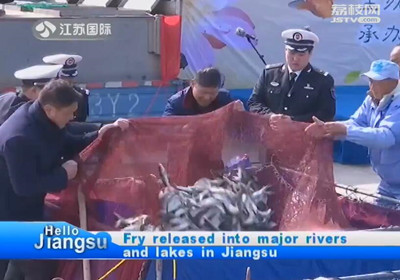East China’s Jiangsu province has continued to implement comprehensive measures such as fry release and fishing ban in order to better protect the ecology of the water and improve the quality and stability of the water ecosystems.
Spring is a critical time for the growth and reproduction of aquatic organisms. It is also a golden period for the conservation of aquatic biological resources.
The Provincial Department of Oceanography and Fisheries on Wednesday released fry into the Yangtze River, Taihu Lake, Gehu Lake, Gaobao Shaobo Lake, Hongze Lake, and Luoma Lake to replenish the fishery stock and protect the ecological environment in the rivers and lakes. More than 20 million fry were released.
At the same time, in order to prevent large numbers of fry and ovulation fishes from being caught, a fishing ban came into force on March 1 over the waters of the Yangtze River basin and the mainstream of the Huaihe River.
Multiple law enforcement agencies in Jiangsu have jointly launched a simultaneous law enforcement action during the fishing ban, cracking down on illegal and serious violations of resources and ecology such as electrocuting and poisoning fish.
In Shagang Port of Zhenjiang City, fishing boats that used to be active in this area are all anchored ashore. Fishermen have gathered up the fishing tools and put them in the cabin.
When the fishing ban in the Yangtze River was first enacted in 2002, many fishermen showed resistance by refusing to comply with the statutory order. The improvement of the water ecology and the increase of the fishing yield, however, have boosted the fishermen’s income growth. At the same time, the government has provided subsidies for the fishermen to overspend the fishing ban period. Feeling at ease, the fishermen have now taken the fishing ban a routine in their life.
Through many years of prolonged breeding and spring fishing ban, Jiangsu has increased the fishery stocks and improved the water ecosystem. In recent years, the fishery resources of the Yangtze River in the province have been improving, and the unit catches have increased significantly after the implementation of the fishing ban. The detected catch species have been relatively stable, and the biodiversity level of benthic animals has continuously increased.
(Source:Jiangsu International Channel)






